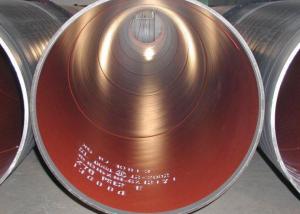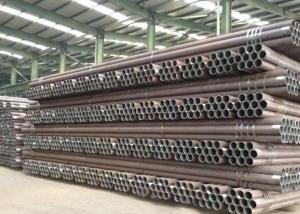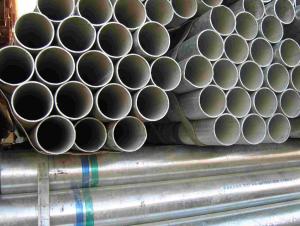Hot-rolled seamless steel tubes for hydraulic pillar service
- Loading Port:
- Qingdao Port
- Payment Terms:
- TT or LC
- Min Order Qty:
- 50MT m.t.
- Supply Capability:
- 5000 Tons Per Month m.t./month
OKorder Service Pledge
OKorder Financial Service
You Might Also Like
Best price of Hot-rolled seamless steel tubes for hydraulic pillar service
Specifications of Hot-rolled seamless steel tubes for hydraulic pillar service
1) OD: 1/2''---24'' WT : SCH5 ------SXH XXS
2) shortest time delivery
3)API and ISO
4) IN STOCK
|
Product Description |
Seamless Steel Pipe | ||
|
| |||
|
Chinese Standard |
American Standard |
German Standard | |
|
10# |
A53-A |
St37 |
DIN1626 |
|
A106-A |
St37-2 |
DIN17175 | |
|
A179-C |
St35-8 |
DIN17175 | |
|
20# |
ASTM A106-B |
St45-8 |
DIN17175 |
|
ASTM A53-B |
St42-2 |
DIN1626 | |
|
ASTM 178-C |
St45-4 |
DIN1629/4 | |
|
45# |
ASTM A 1045 |
CK45 |
|
|
16Mn |
A210-C |
St52 |
DIN1629/3 |
|
St52.4 |
DIN1629/4 | ||
|
37Mn5 |
J55 | ||
|
OD |
20mm--377mm; 1/2’’-20’’ | ||
|
WT |
2mm--80mm; SCH40-XXS | ||
|
Packing |
Black paint or varnish ,plastic caps with the both ends | ||
Picturers of Hot-rolled seamless steel tubes for hydraulic pillar service
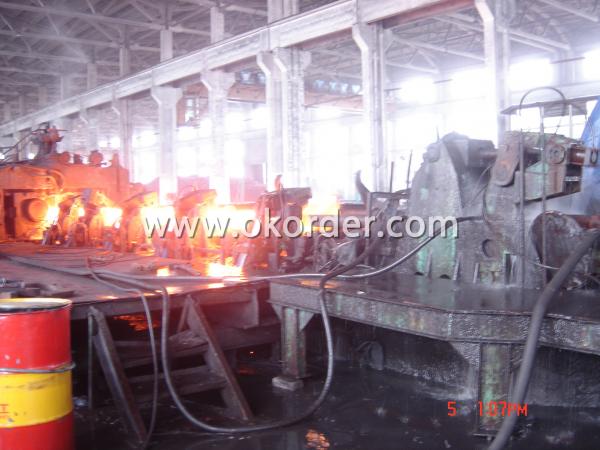
Advanced manufacturering equipment with professional team to ensure good quality.
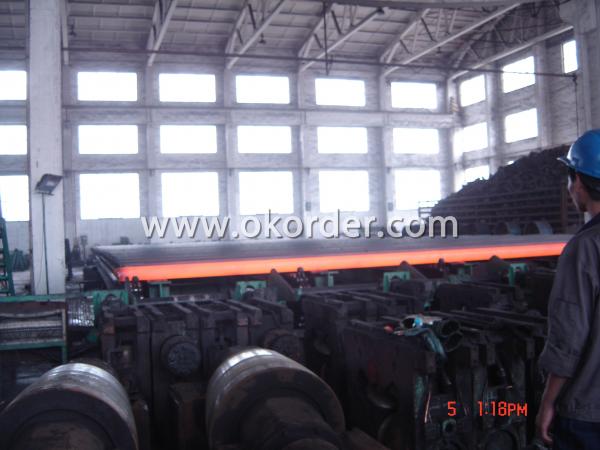
Serious quality check to enusre 100% good quality.
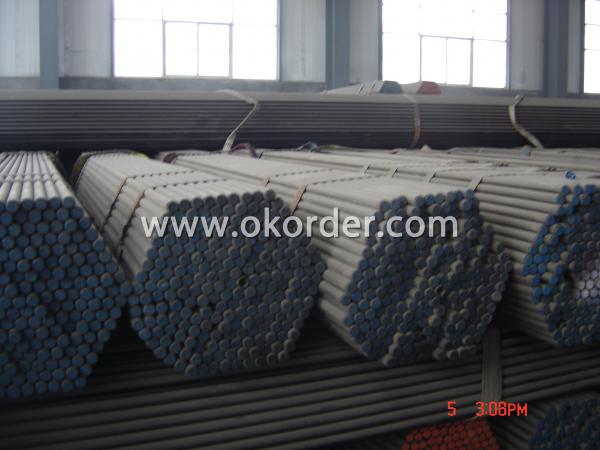
Available stock,in good condition for sale.
Welcome to order from us for Hot-rolled seamless steel tubes for hydraulic pillar service.
- Q:Can steel pipes be used for transporting hazardous materials?
- Yes, steel pipes can be used for transporting hazardous materials. Steel is highly durable and can withstand the pressure and temperature requirements of hazardous material transportation. Additionally, steel pipes can provide a reliable barrier against leaks and spills, minimizing the risk of environmental contamination. However, it is essential to consider the specific properties and compatibility of the hazardous material being transported to ensure the steel pipes are suitable for the task.
- Q:How are steel pipes used in desalination plants?
- Steel pipes are used in desalination plants to transport water, brine, and chemicals throughout the facility. They are highly durable and corrosion-resistant, making them ideal for handling the high-pressure and corrosive nature of the desalination process. Steel pipes ensure efficient and reliable water distribution, contributing to the overall effectiveness of desalination plants in converting seawater into fresh water.
- Q:Can steel pipes be used for underground steam pipelines?
- Yes, steel pipes can be used for underground steam pipelines. Steel pipes are known for their durability and high temperature resistance, making them suitable for transporting steam underground.
- Q:How are steel pipes used in airport infrastructure?
- Steel pipes are used in airport infrastructure for a variety of applications such as constructing hangars, fuel distribution systems, water supply networks, and underground utility lines. They provide structural support, durability, and resistance to extreme weather conditions, making them essential for the smooth functioning and long-term reliability of airport facilities.
- Q:What is the purpose of pipe flanges in steel pipes?
- The purpose of pipe flanges in steel pipes is to provide a secure and leak-proof connection between two pipes or fittings. Flanges act as a connection point, allowing easy assembly and disassembly of pipes while ensuring a tight seal to prevent any leakage or loss of fluid or gas.
- Q:How are steel pipes used in the manufacturing of pharmaceutical equipment?
- Steel pipes are commonly used in the manufacturing of pharmaceutical equipment for various purposes such as transferring fluids, gases, and chemicals, as well as providing structural support to the equipment. These pipes are known for their durability, corrosion resistance, and ability to withstand high pressure, making them ideal for ensuring the safe and efficient operation of pharmaceutical machinery.
- Q:How are steel pipes protected against corrosion?
- Steel pipes are protected against corrosion through various methods such as coating them with protective materials like paint or epoxy, galvanizing them with a zinc coating, or using cathodic protection techniques such as sacrificial anodes or impressed current systems.
- Q:How do you measure the thickness of a steel pipe?
- To measure the thickness of a steel pipe, you can use various methods depending on the precision required and the tools available. Here are three common approaches: 1. Calipers or Vernier Calipers: Calipers are a simple and widely used tool for measuring thickness. Open the calipers and place the jaws on either side of the pipe, ensuring they are perpendicular to the surface. Close the jaws until they lightly touch the pipe, then read the measurement on the caliper scale. 2. Ultrasonic Thickness Gauge: This method offers more accurate results and is often used in industrial settings. An ultrasonic thickness gauge emits high-frequency sound waves that penetrate the steel pipe. By measuring the time it takes for the sound waves to bounce back, the gauge calculates the thickness of the pipe. Ensure the pipe surface is clean and smooth before taking the measurement. 3. Magnetic Thickness Gauge: This method is specifically designed for measuring the thickness of ferrous materials like steel. The gauge contains a small magnet that adheres to the pipe surface. By applying a magnetic field, the gauge measures the distance between the magnet and the base plate. This distance corresponds to the thickness of the steel pipe. It's important to note that each method has its own accuracy limitations, and the choice of measurement technique should be based on the desired precision, availability of tools, and the specific requirements of the application.
- Q:What are the different end finishes for steel pipes?
- There are several different end finishes for steel pipes, depending on their intended use and the specific requirements of the application. Some of the most common end finishes for steel pipes include: 1. Plain End: This is the simplest and most common type of end finish, where the pipe is cut square at both ends without any additional treatment or threading. Plain end pipes are typically used for low-pressure applications or when the pipe will be connected using welding methods. 2. Beveled End: A beveled end finish involves cutting the pipe at an angle, usually 30 or 37.5 degrees, to facilitate easier welding and create a stronger joint. Beveled end pipes are commonly used for butt-welding applications, where two pipes are joined together by aligning the beveled ends and welding them. 3. Threaded End: In this end finish, the pipe is threaded at both ends to allow for easy connection with threaded fittings or couplings. Threaded end pipes are commonly used in plumbing and gas distribution systems, as well as for applications that require frequent disassembly and reassembly. 4. Coupled End: Coupled end finishes involve the installation of couplings or connectors at each end of the pipe. This allows for quick and easy connection of pipes without the need for additional threading or welding. Coupled end pipes are often used in oil and gas pipelines or in applications where rapid installation is required. 5. Grooved End: A grooved end finish involves cutting grooves into the pipe's ends and using mechanical couplings or fittings to join the pipes together. This type of end finish is commonly used in fire protection systems, as well as for large-diameter pipes that require quick and efficient assembly. 6. Flanged End: Flanged end finishes involve attaching flanges to the pipe ends, which can be bolted together to create a secure and leak-proof connection. Flanged end pipes are commonly used in applications that require easy disassembly and reassembly, such as in chemical plants or refineries. It is important to note that the choice of end finish for a steel pipe depends on factors such as the application, the required joint strength, the type of connection method, and the compatibility with other system components. Consulting with a professional or referring to industry standards is recommended to ensure the correct end finish is selected for a specific application.
- Q:How are steel pipes used in the manufacturing sector?
- Steel pipes are widely used in the manufacturing sector for various purposes such as transporting fluids, gases, and solid materials, as well as providing structural support in buildings and machinery. They are commonly used in industries like oil and gas, construction, automotive, and manufacturing plants for their durability, strength, and resistance to corrosion. Steel pipes enable efficient and reliable transportation of materials, facilitating the manufacturing process and ensuring the smooth operation of industrial systems.
1. Manufacturer Overview |
|
|---|---|
| Location | Henan, China |
| Year Established | 2001 |
| Annual Output Value | 800,000Tons |
| Main Markets | Europe and the United States; Canada; India; South etc. |
| Company Certifications | API 5L; API 5CT; GB/T19001-2000 idt ISO9001:2000 |
2. Manufacturer Certificates |
|
|---|---|
| a) Certification Name | |
| Range | |
| Reference | |
| Validity Period | |
3. Manufacturer Capability |
|
|---|---|
| a)Trade Capacity | |
| Nearest Port | Qingdao; Lianyungang |
| Export Percentage | 50% - 60% |
| No.of Employees in Trade Department | 1000-1100 People |
| Language Spoken: | English; Chinese; Spanish |
| b)Factory Information | |
| Factory Size: | Above 423,000 square meters |
| No. of Production Lines | Above 10 |
| Contract Manufacturing | OEM Service Offered; Design Service Offered |
| Product Price Range | Average |
Send your message to us
Hot-rolled seamless steel tubes for hydraulic pillar service
- Loading Port:
- Qingdao Port
- Payment Terms:
- TT or LC
- Min Order Qty:
- 50MT m.t.
- Supply Capability:
- 5000 Tons Per Month m.t./month
OKorder Service Pledge
OKorder Financial Service
Similar products
New products
Hot products
Hot Searches
Related keywords

